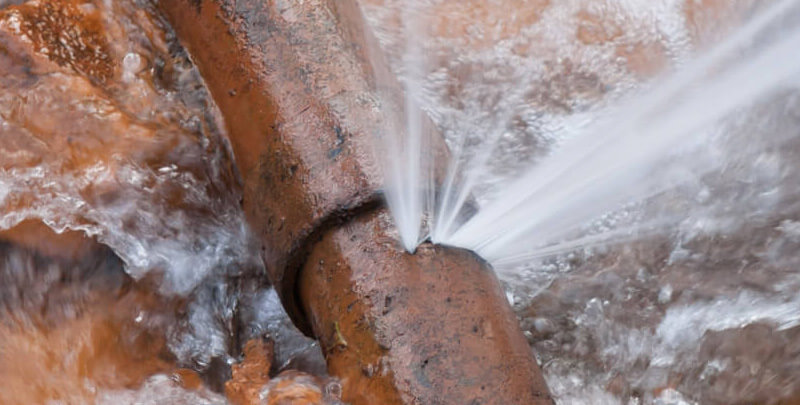
Should I Call a Professional for a Burst Pipe?
Ever heard a little too much noise coming out of your pipes, and then met with the sudden calamity of water flooding your home? Yes, we're talking about burst pipes.
It’s inconvenient, it’s messy, and it begs one important question – should you call a professional or give it a go yourself?
So, let’s dig in and explore the perplexing world of burst pipes.
What’s with a Burst Pipe?
A burst pipe happens when the pressure inside your pipe exceeds its limit, causing the pipe to fail and water to escape rather forcefully. This unfortunate little eruption doesn’t just interrupt your water supply. A water leak also risks serious damage to your home.
Recognising the Signs of a Pipe on the Brink
So you’re worried your pipes might be on the brink of bursting? Here are some ways to help identify if your pipes are about to raise the white flag.
-
Unusual Sounds from the Pipes
Ever woken up in the middle of the night with a strange sound coming from your plumbing system? Those unusual, eerie sounds emerging from your pipes can be a sign of excess water pressure or obstructions. It’s not ghosts having a go at your plumbing; it’s your pipes crying out for help!
-
Mysterious Wet Patches
Stumbling upon wet patches on floors, walls, or ceilings might be straight out of a B-grade horror flick. But hold your horses! It might just be a leaking pipe secretly announcing its retirement. Often, unexplained wet areas can be an early sign that your pipe is having a hard time keeping it together.
-
Reduced Water Flow
If your taps and showers have suddenly decided to take a break from gushing water, it might be a tell-tale sign that something is amiss in your pipe network. Reduced water flow can indicate a clogged or weak pipe on the verge of bursting.
-
Spikes in Your Water Bill
Did your last water bill make your jaw drop like you’ve won the lottery but in reverse? This sudden, unexpected spike in your water bill is a not-so-subtle hint that your pipe leaks and might throw in the towel at any moment.
-
Frozen Pipes
The frosty rhythms of our chilly seasons cause pipes to dance the temperature tango and might cause them to freeze. When water in your pipes turns into ice, it can expand and exert tremendous pressure on the walls of the pipe. This added pressure can eventually lead to spectacular burst water pipes, flooding your home with an Arctic surprise.
-
Water Metre Test
The water metre test can be a lifesaver when it comes to catching sneaky leaks. If the water metre is still racking up those digits even after you’ve turned everything off and shut all the taps, your pipes are holding a secret. Your water pipes might also be preparing for a watery farewell.
So, the next time you hear weird noises or feel like you’ve walked into a haunted water park, maybe it’s your pipes saving you from a world of inconvenience.
Discovering the Causes of a Burst Pipe
Now that you know how to recognise a pipe that’s about to burst, it’s time to understand why it happens. Let’s dive into this plumbing puzzle to figure out the culprits wreaking havoc on your home’s watery network.
- Extreme pressure: Imagine being squashed in a crowded elevator with no room to breathe. That’s your pipe when the pressure goes overboard. When you supply more water than what your pipes can carry, they raise a white flag and burst to let off steam.
- Hard obstructions: Ever bumped into a pole while walking and texting? That’s how your pipes feel with an obstruction in the middle. When water hits stubborn blocked pipes, it accumulates and builds up pressure, leading to a colossal burst and a serious case of plumber’s remorse.
- Icy temperatures: Even pipes dislike the frigid depths of downtime. Chilling temperatures can make them freeze over like you’re on the biggest roller coaster at Dreamworld. When the water inside the pipes turns to ice, it expands, putting those poor pipes under immense stress. leading to a grand spectacle of a burst water pipe.
- Normal wear and tear: Pipes can’t dodge the old tick-tock of the clock. They’re not going to maintain their youthful vigour forever, and with age, pipes get weaker. Rusting, corrosion, and general wear and tear can lead to a pipe’s demise and a flashy exit in the form of pipes burst.
- The invasion of tree roots: Hate to break it to you, but tree roots are a sneaky bunch. In their quest for moisture, they can invade your pipes. Prolonged invasion weakens the pipe structure, and one fine day – boom! The pipe bursts, and your home turns into a not-so-splashtacular water park.
Unpacking those burst pipe mysteries isn’t as hard as learning to throw a boomerang, right? Just keep your eyes peeled for the signs, and when things look suspicious, let your local plumber step in and save the day!
Why Dial a Water Damage Restoration Company?
Burst pipes aren’t just annoying. They can cause significant water damage to your house. If left unattended or mishandled, it can run deep into the structure of your home, leading to issues like mould, mildew, and structural instability.
It is vital to appoint a reputable plumber who can deliver swift and efficient repair work.
Professional Plumbers have the necessary experience to carry out an in-depth plumbing inspection, from a broken pipe to a substantial water main leak. Their friendly team is equipped with specialised tools tailored to handle plumbing problems and perform necessary repairs.
Did you know that burst pipes can also happen outside the “9 to 5?” Well, that’s when emergency plumber services shine. Plumbers and emergency plumbing services are around the clock, making sure that you have someone to rely on in such scenarios.

Preventing a Burst Pipe
Prevention is always better than a burst pipe flooding your living room. Here are some down-to-earth steps to help you steer clear of the whole pipe-bursting debacle and dodge that watery fiasco.
- Routine checks and maintenance: A regular visit from your trusty plumber can be as refreshing for your pipes as a jump into the billabong on a scorching day. Routine checks will spot any pesky issues before they snowball into a calamitous burst of water pipes.
- Reduce water pressure: High water pressure isn’t just a pipe’s nightmare. It’s the leading reason for their untimely demise. Reducing the excessive water pressure used in your home helps your pipes live a long, serene life without the risk of bursting. Think of it as giving your pipes a holiday!
- Insulating your pipes: Curbing pipe freezes is a tad bit easier when they’re all wrapped up snugly like a joey in a kangaroo’s pouch! Insulating your pipes, especially before temperamental weather swings, can save you from a late-night icy pipe-burst party.
- Clearing blockages: Water should flow smoothly and effortlessly through your pipes. Regularly cleaning and unblocking your pipes prevents water from collecting and putting pressure on the pipe walls. Thus, it can stop pipe bursts from being part of your daily drama.
- Check out tree roots:Don’t let those sneaky tree roots get in your pipelines. Regular inspection and removal of interfering tree roots will make sure they aren’t planning an undercover invasion leading to a disastrous pipe burst.
Burst pipes might seem as predictable as Australia’s weather, but with these preventive measures, you can save yourself money, time, and hassle. Remember, early action is still the best weapon to battle burst pipe woes.
Understand, Detect, and Call a Pro
When it comes to a burst water supply, it’s always best to be on the side of caution. Don’t ignore the little signs that your house gives you. Recognising these early warnings and calling in the professionals just might save you from the inconvenience of major water damage.
With their swift service, expertise, and round-the-clock availability, plumbers are your rescue rangers in a pipe that’s on the brink of a burst. And remember, maintaining your pipes well is just as crucial as having the number of a good plumber on a speed dial.
Please note: This information is provided for advice purposes only. Regulations differ from state to state, so please consult your local authorities or an industry professional before proceeding with any work. See our Terms & Conditions here.